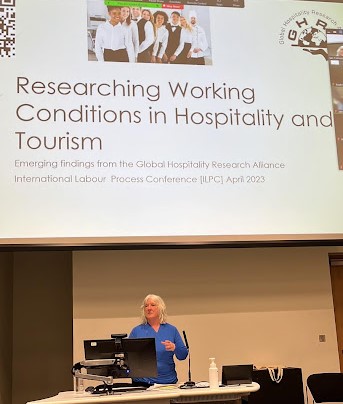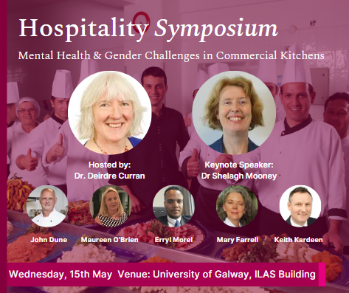
Research by J.E. Cairnes School of Business and Economics at University of Galway has found that although workers in the hospitality industry are often passionate about their work, the industry is experiencing a chronic labour shortage. Poor conditions and lack of prospects are some of the key reasons. Now a new global alliance aims to tackle conditions in hospitality through educating policy makers and industry leaders about what is needed to ensure “decent work”, and Ireland is positioned to be a leader in the field.
For more than a quarter century I have been teaching young people about the employment relationship, how that relationship works, what happens if/when it goes wrong, where to look for advice or support. Over that time, I have come to know, through my students, that the employment relationship in hospitality and tourism poses unique challenges by its very nature.
There is no doubting the importance of this industry to the Irish economy, not least as a very significant provider of jobs. CSO data for the final quarter of 2023 show that accommodation supported 50,300 jobs directly, and food and beverage service activities supported 132,800 jobs. We must also acknowledge that the industry has come under increasing pressures, as detailed in this analysis: “domestic consumer spending is under some pressure; there is a shortage of accommodation […]; the costs of doing business have increased significantly […], particularly labour costs and energy; labour shortages are very obvious; and the cost base is being damaged by a number of State-induced upward pressures on labour costs, which are set to be rolled out this year and in the coming years”.[1]
The hospitality industry is overwhelmingly comprised of small, fragmented establishments, often owner-managed by people who are passionate about food/service, but not necessarily trained to manage people. In contrast, many of the larger hotels are owned/managed by business conglomerates who may not have direct experience of the sector.
Hospitality establishments are traditionally hierarchical. Activity lulls are interspersed with bouts of intense pressure, in what is a highly competitive, high-risk market. The predominantly low-paid, less-skilled, non-unionised workforce is bottom-heavy with women, migrants and transient labour.
However, this industry is historically infamous for low pay and poor working conditions. Everyone I speak to about my research – from politicians to employers, customers, workers and students – knows there’s truth in what the data is telling us. Many of my students work in hospitality and tourism to support their education expenses. They know what the issues are, and they have wonderfully creative solutions, if only someone would listen.
A proportion of the workforce is transient but many people would like to make a decent living from their work. Similarly to employers, workers are also subject to sharply rising costs of living including accommodation, child-care, transport, energy, etc. Evidence suggests that it is impossible to live on the minimum wage and yet employer representatives consistently decry any move to increase it.[1] The current minimum wage is €12.70 per hour, but the “living wage”, benchmarked against the actual cost of living, currently stands at an elusive €14.80 per hour. My basic contention is this – convert hospitality jobs to “decent jobs” and people will stay.
Regarding employment rights, too often in hospitality work the “minimum wage” is treated as a maximum and recommendations to increase it meet with warnings of impending business closures. As a trade unionist said to me recently, if your business model relies on low pay and poor working conditions, then perhaps it is time to rethink the model.
Breaches of employment rights are common in this sector. My 2021 research indicates that 70% of respondents did not get their entitlement to a Sunday premium, 52% did not get their entitlement to rest breaks and 43% did not get a proper contract on commencing employment.[1] The law represents a minimum standard that all workers in Ireland are entitled to.
Workers in “accommodation and food services” are disproportionately represented in the statistics for low pay, and consistently earn the lowest “average hourly earnings” of all sectors.[2] On the job security front, workers in “accommodation and food” were second highest in terms of insecure work, and second most anxious about future prospects.[3]
There are two primary issues regarding employment rights. Firstly, workers are often unaware of their legal rights and how to source information. Secondly, enforcement is an issue. Workers in precarious sectors such as hospitality are reluctant to raise issues of legal rights for fear of negative consequences. The primary enforcement body is the Workplace Relations Commission (WRC), which can “visit places of employment and carry out investigations on behalf of the Commission in order to ensure compliance with employment-related legislation”.[4] In its 2022 Annual Report, the WRC Inspectorate reported carrying out 5,820 inspection visits, detecting over 5,700 contraventions of legislation. Inspections in “Beverage Service Activities” revealed non-compliance of 49%, in “Food Service Activities” 46%, and in “Hotels” 30%. These non-compliances resulted in recovery of over €700,000 in unpaid wages.[1]
According to the International Labour Organisation (ILO), “decent work” underpins ALL of the 17 Sustainable Development Goals (SDGs).[1] I would argue everyone is entitled to a decent job. Scholars and organisations like the ILO have grappled to identify the elements of “decent work”, and generally agree that it includes a fair income; some degree of job security; working conditions that are psychologically and physically safe; legal protections and opportunities for voice. While those ingredients may seem logical and unsurprising, my research suggests a shortfall in many aspects, for many workers.
It became clear as we emerged from the pandemic that those who left the industry did so for better working conditions, rather than because they wanted to leave per se. If the challenges of low pay, unsocial hours, lack of career progression, absence of employee voice, etc. were addressed, there would arguably be no chronic labour shortage in this sector. My research shows that hospitality workers generally really like their jobs. Because the work is often pressured and intense, workers form close, lasting bonds with co-workers, who become the hub of their social network. They love the satisfaction of delivering good service and acknowledgement from customers, whether or not in the form of a tip. They love the “buzz” of the “performance” that is hospitality work, and the dynamic nature of each shift.
Research also indicates that hospitality workers know what is wrong and how to make it right, but they have no voice platform. Fewer than 7% of hospitality workers were members of a trade union in 2021, the lowest density of all sectors.[2] My research, which essentially represents the voice of workers, informed the 11 recommendations of the 2022 government report Working Conditions and Skills Shortages in Ireland’s Tourism and Hospitality Sector. I firmly believe that these recommendations have the capacity to transform the industry.[3] I was also able to use evidence-based arguments to positively influence new legal protections around tips.[4] Undoubtedly, there is a better way. We need more evidence-based discussions on what is working well and what needs to change. We need more ethical leadership from within the industry.

An exciting recent development has been the evolution of the Global Hospitality Research Alliance (GHRA). This expanding collective of scholars using “intellectual activism” to contribute to evidence-informed debate on decent work in hospitality has grown steadily out of the research I began in Ireland. This research was replicated in Scotland, Norway, New Zealand and Australia, giving us the start of a comparative database by which to learn and grow. The Alliance currently has 62 academics from 21 countries, and projects including a book and an exploration of the experience of Ukrainian refugees in hospitality work in Ireland and Scotland.
In May 2024 members of the Alliance will visit our campus for a series of research-informed events. Dr Shelagh Mooney from Auckland University of Technology will act as keynote speaker for a symposium on Mental Health and Gender Challenges in Commercial Kitchens. Dr Mooney will be joined by an expert panel, and it is hoped the event will attract a wide range of industry experts who will contribute to an emerging plan of action. In 2024 the GHRA will launch a global study of hospitality working conditions across 10 countries. This comparative data will facilitate shared learning about what’s working and what needs to change.

The labour shortages in the hospitality and tourism industry after the pandemic have proved a potential tipping point (pun intended) for hospitality work. Moreover, it is unlikely that Generations Z and Alpha will tolerate current hospitality working conditions. Clearly, change is needed. The economy will always need hospitality. While the retail industry can pivot online, human beings will always feel the need to socialise over food and drink. Why not make hospitality an industry that capitalises on worker passion, by offering decent work that can sustain long-term and rewarding careers? Improving working conditions is not a charity argument; it’s a business case. Better conditions, career prospects and work–life balance, and increased employee voice, will pay dividends for employees, employers, customers and society at large. My vision for Ireland’s hospitality and tourism sector is that, through the Global Alliance, it moves toward becoming a recognised global leader and an exemplar for the industry worldwide.